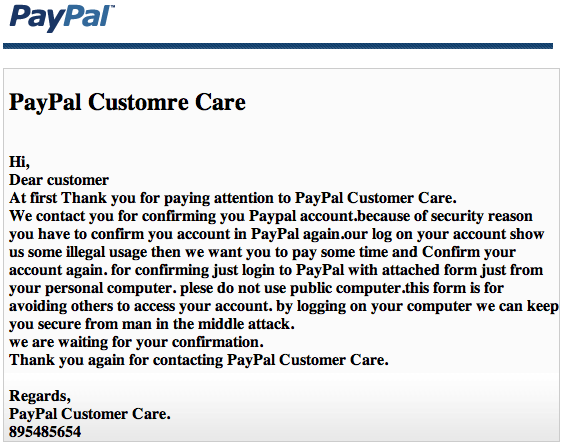We've all heard the horror stories; the lonely woman who was duped into "falling in love" with a con artist, the naïve student who thought they could ease some of their financial woe by helping a unfortunate Eastern European clear some lottery winnings, or the phishing email that persuaded a less than tech-savvy elderly person to hand over their online banking credentials and credit card details, only to see their entire life savings stolen. The truth is that any of us could fall victim, no matter how security conscious we are - our very own Angela Alcorn was almost caught out by a Western Union scam last year.
Although we've frequently looked at how to avoid online scams and what to do if you are unfortunate enough to be on the receiving end of one, we've never really gone "behind the scenes". Who are the people on the other end of these frauds? Where is the money going? We take a look…
West Africa and the 419 Scam
West African countries are the arguably the most famous practitioners of the well-renowned "419 scam"; more officially known as "advance fee fraud".
If you've had an email account for any length of time, you'll surely be aware of the type of correspondence the scammers use. Typically they plead for help, citing civil war, family deaths, government intervention, or medical issues as a reason for needing your assistance in moving their fortune to a new location.
The scam originated in Spain in late 1700s and was known as the "Spanish Prisoner" trick. The modern version of the con was developed in poverty-stricken areas of Nigeria in the 1980s, gaining its "419" tag in reference to the particular article of the Nigerian Criminal Code which deals with fraud.
Although Nigeria is the most frequently-cited country of origin, the usage of the con has now spread to all parts of West Africa. Basil Udotai, the former Nigerian cyber-security director, was quoted in a recent Economist article as saying "There are more non-Nigerian scammers claiming [to be] Nigerian than ever … [because] Nigeria's dreadful reputation for corruption makes the strange tales of dodgy lawyers, sudden deaths, and orphaned fortunes seem plausible in the first place".
The facts back up Udotai's assertions. A recent study found that from the 85 percent of 419 scam emails that named a West African country, 51 percent mentioned Nigeria, while places such as the Ivory Coast, Burkina Faso, Ghana, and Senegal all scored highly.
Nonetheless, in a part of the world where the average salary is a mere $2 USD per day, most rational "Westerners" might be able to find it their hearts to sympathise with the scammers. Some of the most successful ones can now be worth upwards of $60,000, though the average pay-out for a job has dropped from $12,000 to $200 in the last decade.
It's worth noting that IP address tracers suggest that 54 percent of advance fee fraud emails come from the US and Europe, but with so many fraudsters now "outsourcing" their mailing lists to botnets, it is unlikely that these figures are a true reflection of the reality.
America
Despite the infamy of the West African scammers, they actually only account for a small percentage of online criminals and fraudsters. Research in 2006 found that just six percent of cyber-criminals were based in Nigeria, while 16 percent were based in the UK and a massive 61 percent in the United States.
The scale of the problem is reaching pandemic levels, though why the US is so much worse for online fraud than equivalently developed countries in Europe and the Far East remains a mystery. For the scale of the problem you need to look no further than last week's news, when two former FBI agents were charged with stealing Bitcoins and laundering money during the bureau's investigation of underground black market website, the Silk Road.
The American scammers are considerably more sophisticated than their African counterparts. Tactics are diverse, with popular swindles including search engine optimisation fraud (SEO) (where businesses are lured into paying for SEO improvements without seeing any returns), Internet ticket fraud (where websites claim to be offering tickets for in-demand concerts and sporting events, often at a great discount), phishing attacks (when a user is presented with what appears to be a legitimate website that is actually fraudulently acquiring sensitive information such as bank details and credit card numbers), and online stock market manipulation (where the scammer tries to manipulate stock prices for their own gain).
The money acquired from these scams can end up in any number of places. It is typically split between individual personal gain (such as houses, cars, boats, and other luxury items), and international criminal gangs. While individual theft is clearly a problem, it is criminal gangs who pose the biggest threat; money that has been fraudulently acquired online has been successfully linked to drug trafficking, human trafficking, kidnapping rings, and terrorist activities in the past.
The Cost
Make no mistake, online fraud is a huge, sprawling industry. This is about more than one shady criminal gang or a clever conman living in a mansion in the Bahamas. In the middle of 2014 the total annual cost of online fraud to the global economy was estimated to be $445 billion – that's $74 for every man, woman, and child on the planet. If it were a company, it would have the third highest revenues in the world, only behind Chinese oil and gas giant Sinopec and retail chain Walmart, and ahead of British oil conglomerates Shell (4th) and BP (6th), and the US's Exxon Mobil (5th).
Personal Experience
Remember, there are lots of ways to spot a con and help yourself avoid becoming a victim. Nevertheless, with the "Internet of things" becoming more all-encroaching and pervasive in our lives there are an increasing number of points that the criminals can exploit – we need to be vigilant.
What is your experience with online fraud and its prevention? Have either you or someone you know ever been a victim? Perhaps you decided to play along with a fraud in order to learn more about the sector? Do you have any tips or advice for your fellow readers?
Either way, we'd love to hear from you. Let us know your thoughts and feedback in the comments section below.
Image Credits: hacker with money Via Shutterstock




